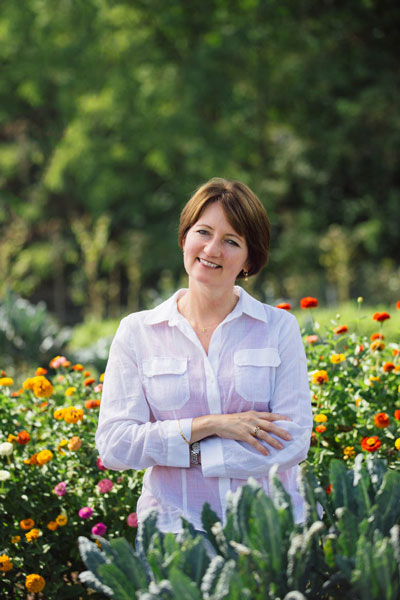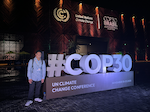
 Political Science Prof. Caroline Hartzell first became interested in her area of research, contemporary civil conflicts, because of her mother’s background. “My mother is from Colombia,” she explained, “a country that has had more than one civil war.”
Political Science Prof. Caroline Hartzell first became interested in her area of research, contemporary civil conflicts, because of her mother’s background. “My mother is from Colombia,” she explained, “a country that has had more than one civil war.”
As a result, Hartzell began studying how negotiated settlements and power-sharing agreements end civil wars. Hartzell was the founding director of the College’s Globalization Studies program, the first director of the Center for the Study of Global Issues, and editor of the journal Conflict Management and Peace Science.
At the time of this interview, she was just starting her sabbatical. Her plan was to focus on finishing a book on power sharing and the effect it has on post-conflict democratization. But Hartzell’s to-do list has grown since then. Recently, she and two collaborators from Towson University and the Research Triangle Institute received a three-year grant from the National Science Foundation, to study power sharing, political goods provision, and post conflict stability in the Mindanao region of the Philippines.
“What we’re doing is survey research in Mindanao,” Hartzell said. “The region in the Philippines has had many conflicts and several peace agreements over the years. We are finding out how much people on the ground know about the peace agreement, and also getting their thoughts and perceptions on whether or not these components of the peace agreements have had an impact on their lives.”
In the Mindanao region, a socioeconomic disparity between a Christian majority and Muslim minority has led to violent conflict—tens of thousands of deaths and the displacement of millions. Indigenous minority Muslim groups, known as Moros, consider the history of conflict against the Japanese, Filipinos, Spanish, and Americans as part of a four-century-long liberation movement. In 2012, the largest Muslim rebel group, the Moro Islamic Liberation Front, agreed to end the conflict and reached a peace agreement with the Philippine government in 2014. But today the region is still plagued by conflict as breakaway rebel groups continue to fight despite the agreement.
This summer, Hartzell’s plans to visit the region were waylaid by fighting between government troops and Islamists who’ve sworn allegiance to the Islamic State. “Two days before I was scheduled to arrive, conflict broke out in Marawi,” she said. “So I was headed to the Philippines wondering what was going to happen. I flew in the next morning. A lot of our plans, meetings, and discussion groups were canceled because we couldn’t go to the places we were planning to go.”
Even so, Hartzell’s comments were marked by hope. She believes in the power of policy to facilitate peace. There’s a quote by Otto von Bismarck that Hartzell loves: “Politics is the art of the possible, the attainable—the art of the next best.” She used the phrase for part of the title of an article she co-authored about power sharing and democracy.
“It’s a great quote,” she explained, “especially for a political scientist and not to mention in this era of a lack of compromise in American politics.” Hartzell’s sees her work as driven by “the art of the possible,” and the potential that exists for new democracies.
“Maybe it’s not realistic to expect a perfect functioning liberal democracy immediately following the end of a civil war,” she said, “but the important components of democracy can be put in place, and then it’s up to these countries to work with them.”
However, Hartzell said today the international community seems to be backing away from supporting post-conflict democratization efforts. “There are these policy swings,” she explained, “where the opinion of the international community swings like a pendulum.”
“After the Cold War ended, it was ‘let’s put all these resources in’ and there have been critiques of that. Some critics say power sharing is anti-democratic,” Hartzell said. “We’ve found empirical data that supports the idea that power sharing can help promote minimalist or electoral democracies. It doesn’t promote liberal democracy, but it can lay the foundation for this basic kind of democracy, and then you build on that.”
She asked, rhetorically: “How do you get a peace agreement without components of power sharing?”
“So if that’s a piece of it, let’s learn the impact. Why don’t we take what we know about them and work to build on how they work, or fix parts that aren’t so positive. We’re trying to be realists where other people have been much more idealistic.”


